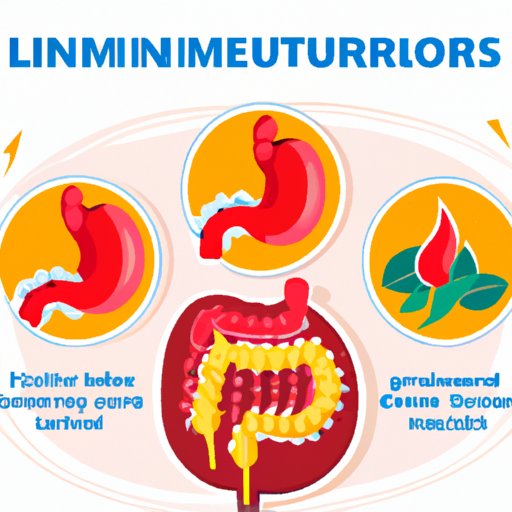
Introduction
If you suffer from inflamed intestines, you’re not alone. It’s a common problem that can be caused by a number of different factors, including food sensitivities, stress, and a sedentary lifestyle. Luckily, there are many natural ways to calm inflamed intestines and reduce symptoms. In this article, we’ll explore some tips and tricks for providing relief to this uncomfortable condition.
Incorporating an Anti-inflammatory Diet
One of the most effective ways to reduce inflammation in the intestines is by incorporating an anti-inflammatory diet. What we eat has a direct impact on our intestinal health, so it’s important to make mindful choices when it comes to food.
Some foods that are known to be anti-inflammatory include leafy greens, fatty fish (such as salmon and mackerel), and spices like turmeric and ginger. These foods contain antioxidants and omega-3 fatty acids that can help reduce inflammation in the intestines.
To make meal planning easier, try preparing meals in advance and incorporating anti-inflammatory ingredients into your recipes. Meal prepping can also save time and reduce stress when it comes to figuring out what to eat throughout the week.
Mindful Eating
In addition to eating anti-inflammatory foods, it’s important to be mindful while eating. When we eat too quickly or under stress, it can worsen inflammation in the intestines and cause discomfort. To avoid this, try to eat slowly and mindfully, paying attention to how your body feels before and after meals.
Avoiding triggers that could exacerbate inflammation is also important. For example, certain foods, like processed or fried foods, can cause flare-ups in those with inflamed intestines. Additionally, stress and anxiety can lead to inflammation, so incorporating stress reduction techniques like meditation and gentle yoga can be helpful.
Maintaining a Consistent Exercise Routine
Exercise is a great way to reduce inflammation in the body, including the intestines. Regular movement can help improve digestion, reduce stress, and support overall gut health.
To make exercise more manageable, try incorporating it into your daily routine. For example, take the stairs instead of the elevator, or go for a walk after dinner. Additionally, finding a type of exercise that you enjoy can make it easier to stick with and reap the benefits.
Reducing Alcohol and Tobacco Intake
Excessive alcohol and tobacco use can lead to inflammation in the body, including the intestines. If you’re a smoker or heavy drinker, reducing or eliminating these habits can significantly improve gut health and reduce inflammation.
If quitting tobacco or alcohol seems daunting, there are support groups and resources available to help. Consult your healthcare provider for guidance on how to find the right support for you.
Adding Supplements
Supplements can also be effective in reducing inflammation in the intestines. Probiotics, for example, can help restore balance to the gut microbiome and reduce inflammation. Omega-3 supplements, like fish oil, can also be helpful in reducing inflammation throughout the body.
It’s important to consult with a healthcare professional before adding supplements to your routine, as they can interact with other medications and may not be appropriate for everyone.
Visiting a Healthcare Professional
If you’re experiencing severe or persistent symptoms of inflamed intestines, it’s important to consult with a healthcare professional. They can help diagnose the underlying cause of your symptoms and create a personalized treatment plan.
To find the right healthcare professional for you, consider asking for a referral from your primary care physician or doing research online to find specialists in gastrointestinal health. Don’t hesitate to seek help when you need it.
Conclusion
Inflammation in the intestines can be uncomfortable and disruptive to daily life. But by making mindful food choices, incorporating stress reduction techniques, and consulting with a healthcare professional as needed, relief is within reach. Remember, it’s important to listen to your body and seek help when you need it. With these tips and tricks, you can calm inflamed intestines and improve your overall gut health.




